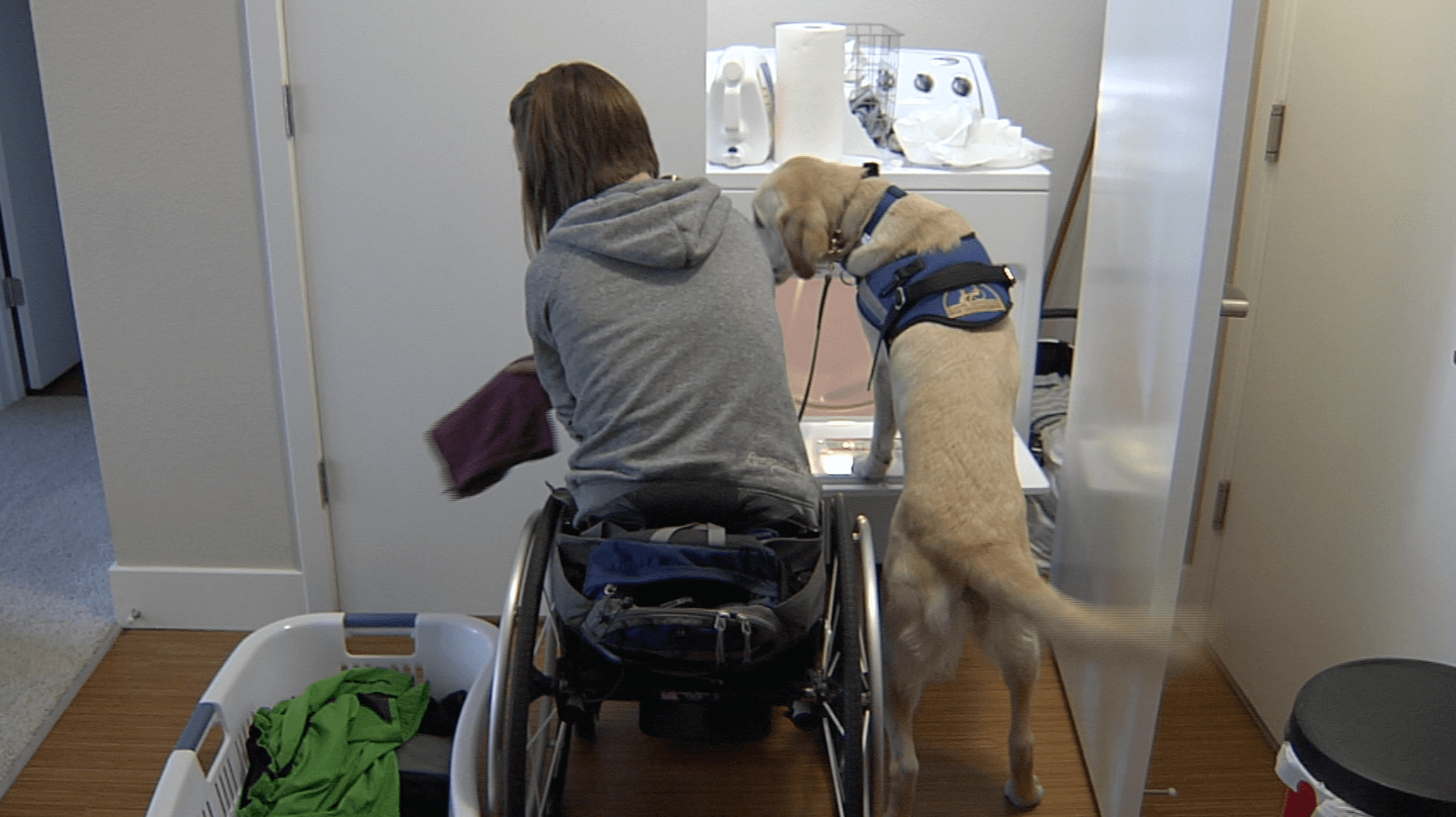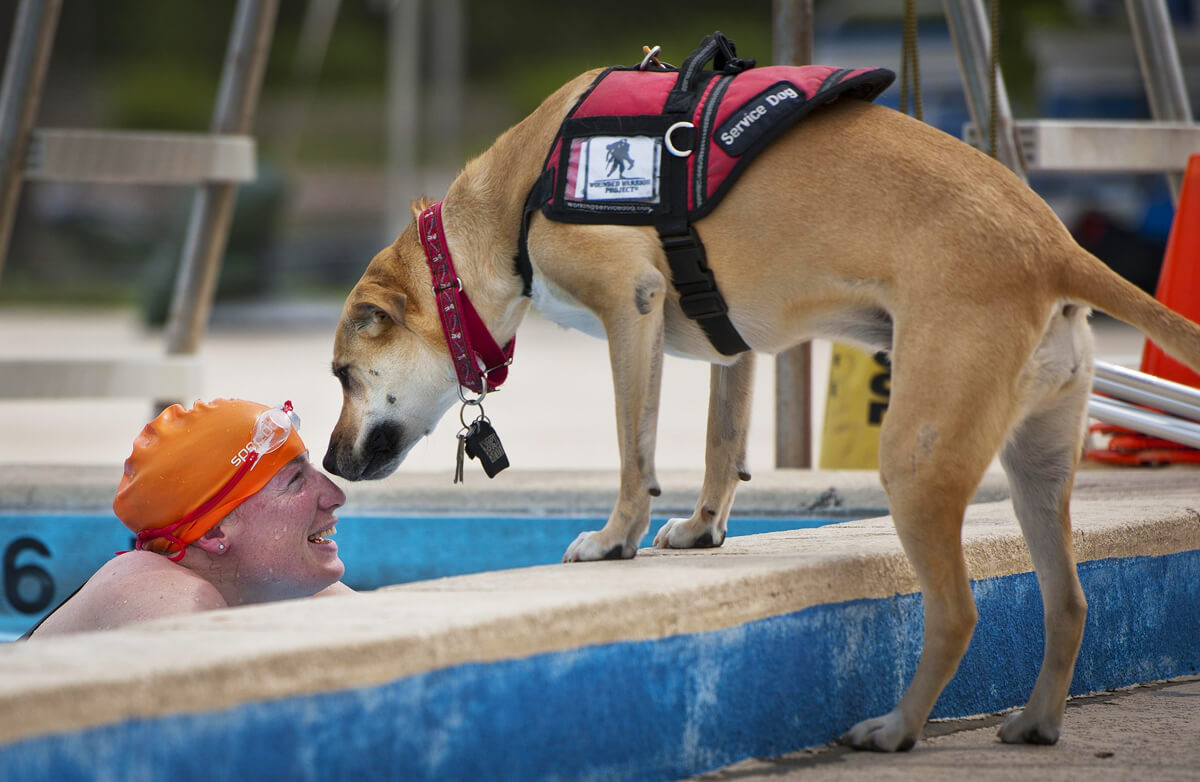What Landlords Need To Know About Service Animals
By DANIEL BORNSTEIN, ESQ.
[apss_share]

After a fleeting post we shared a while back regarding service and comfort animals, we were surprised by the reaction it generated. At the time, we reminded rental property owners and property managers that if they have a no-pet policy, they cannot deny tenancy to a tenant that has a documented service or comfort animal – under the law, these animals are not considered pets.
Excluding disabled persons on account of their animal helpers or companions will expose you to liability.
Given the brisk engagement and questions that followed the post, we felt obligated to address this endearing topic in greater detail.
Service Animal Defined
A “Service Animal”, as defined by Title II and Title III of the Americans With Disabilities Act (ADA) ,is any dog that is individually trained to do work or perform tasks for the benefit of an individual with a disability, including a physical, sensory, psychiatric, intellectual, or other mental disability. These animals can perform a wide variety of tasks, be it pulling a wheelchair, retrieving dropped items, alerting hearing impaired tenants to a sound, reminding the tenant to take medication, or pressing an elevator button, among other tasks.
Generally, these animals are classified as a Guide Dog or Seeing Eye Dog, a Psychiatric Service Dog, SSigDOG (sensory signal dogs or social signal dog), or Seizure Response Dog, each specially trained in their roles to assist their disabled owner.

The distinction between service animals and comfort animals
In contrast, comfort animals are frequently used as part of a medical treatment plan but are not considered service animals under Federal law. Their role may be to provide companionship, perhaps help with anxiety, depression, and certain phobias, but do not have the specialized training to provide the critical tasks needed for disabled persons to function.
Notably, while comfort animals (also known as emotional support animals) must alleviate one or more identified symptoms or effects of a person’s disability, there is no requirement that a comfort animal be individually trained or certified, or that it be a dog.
What is a disability, anyways?
It begs the question of what constitutes a disability. Sometimes, the underlying disability is not so transparent, and controversy can arise when the landlord or property manager questions the veracity of the disability. First, some backdrop.
California law defines “disability” more broadly than the ADA does. While federal law defines disability as an impairment that “substantially limits” a major life activity, California considers a person disabled if they suffer from a physical or mental impairment that merely limits a major life activity. In other words, the disability does not need to be debilitating, but only makes life activities difficult. We don’t want to get lost in the weeds, but the main take-away is that there are a whole new set of disabilities that meet this lower standard, too numerous to mention here.
When the disability or need for reasonable accommodation is not obvious, the rental unit owner may ask for medical documentation from a health care provider that confirms the existence of a disability. If there is any doubt, please consult with Bornstein Law, as you may be inviting a potential discrimination suit.
More insights for landlords
A landlord may deny a request to keep a service or comfort animal if the reasonable accommodation of the specific animal poses a direct threat to the health or safety of others, or would cause substantial physical damage to the property.
Yet if the threat/damage can be reduced or eliminated by another reasonable accommodation, the landlord must allow the animal. Clearly, this an ambiguous standard that depends on the unique circumstances and when in doubt, this nebulous area is best approached with the guidance of Bornstein Law.
We should also note that the law is blind to breed, size or weight – in other words, if you suspect that the animal poses a threat or would cause damage to your rental unit, you must consider the individual animal. You can’t, for example, assume that a large German Shepard is a potential threat because it looks intimidating.
Finally, we hasten to say a landlord cannot charge a pet deposit for a service dog or comfort animal, even if they do so for other applicants or residents because once again, the under the law, the animal is not considered a pet.
 As the founding attorney of Bornstein Law, Broker of Record for Bay Property Group and expert witness, Daniel Bornstein is a foremost and well-respected expert in landlord-tenant disputes and other property management issues with over 23 years of experience in handling real estate and civil litigation related disputes in and throughout the Bay Area. More than a litigator, Daniel manages rental properties, assists in completing real estate transactions and is well known for his educational seminars. He is always eager to answer questions and engage with Bay Area landlords, property owners and real estate professionals. Email him today.
As the founding attorney of Bornstein Law, Broker of Record for Bay Property Group and expert witness, Daniel Bornstein is a foremost and well-respected expert in landlord-tenant disputes and other property management issues with over 23 years of experience in handling real estate and civil litigation related disputes in and throughout the Bay Area. More than a litigator, Daniel manages rental properties, assists in completing real estate transactions and is well known for his educational seminars. He is always eager to answer questions and engage with Bay Area landlords, property owners and real estate professionals. Email him today.

